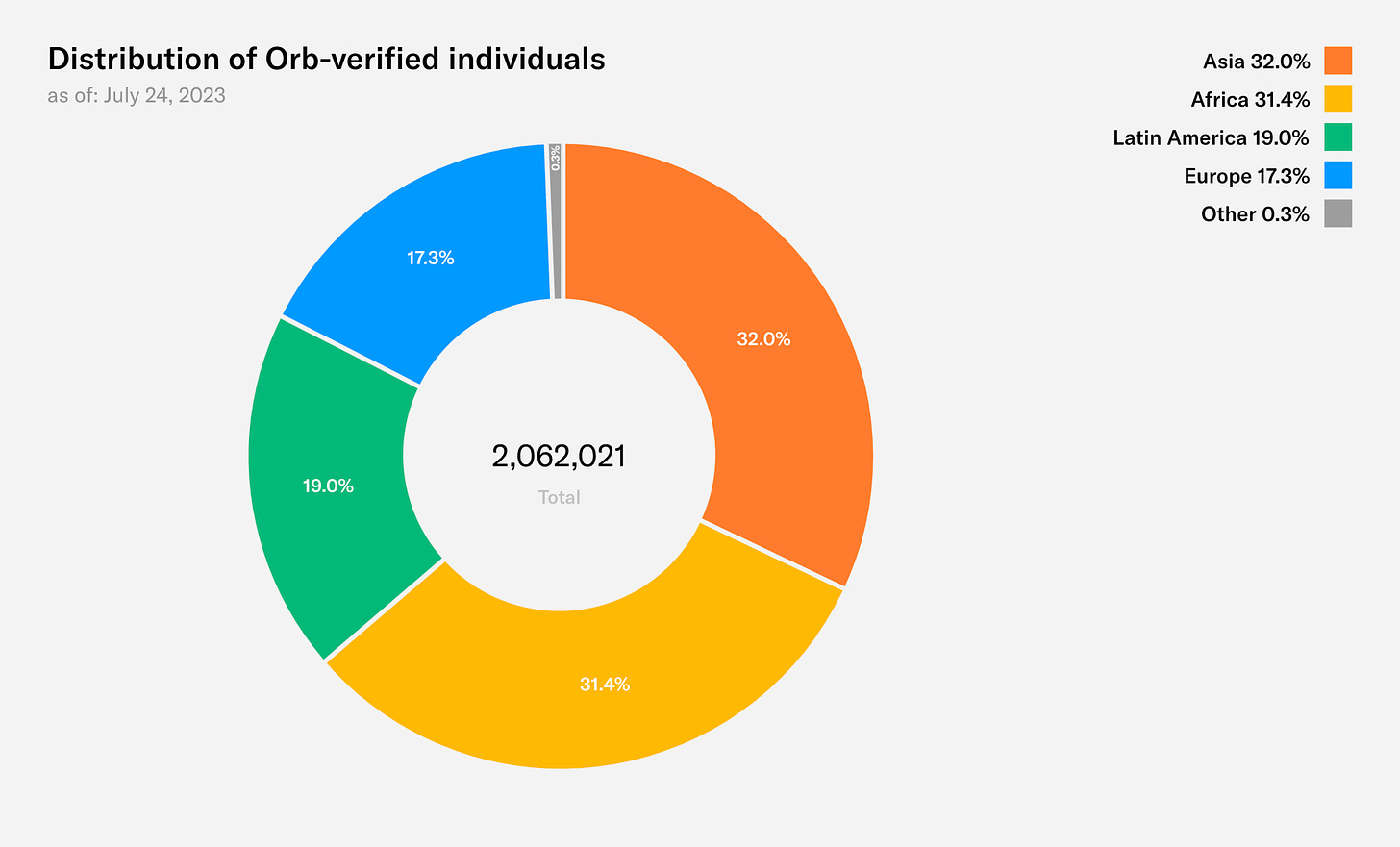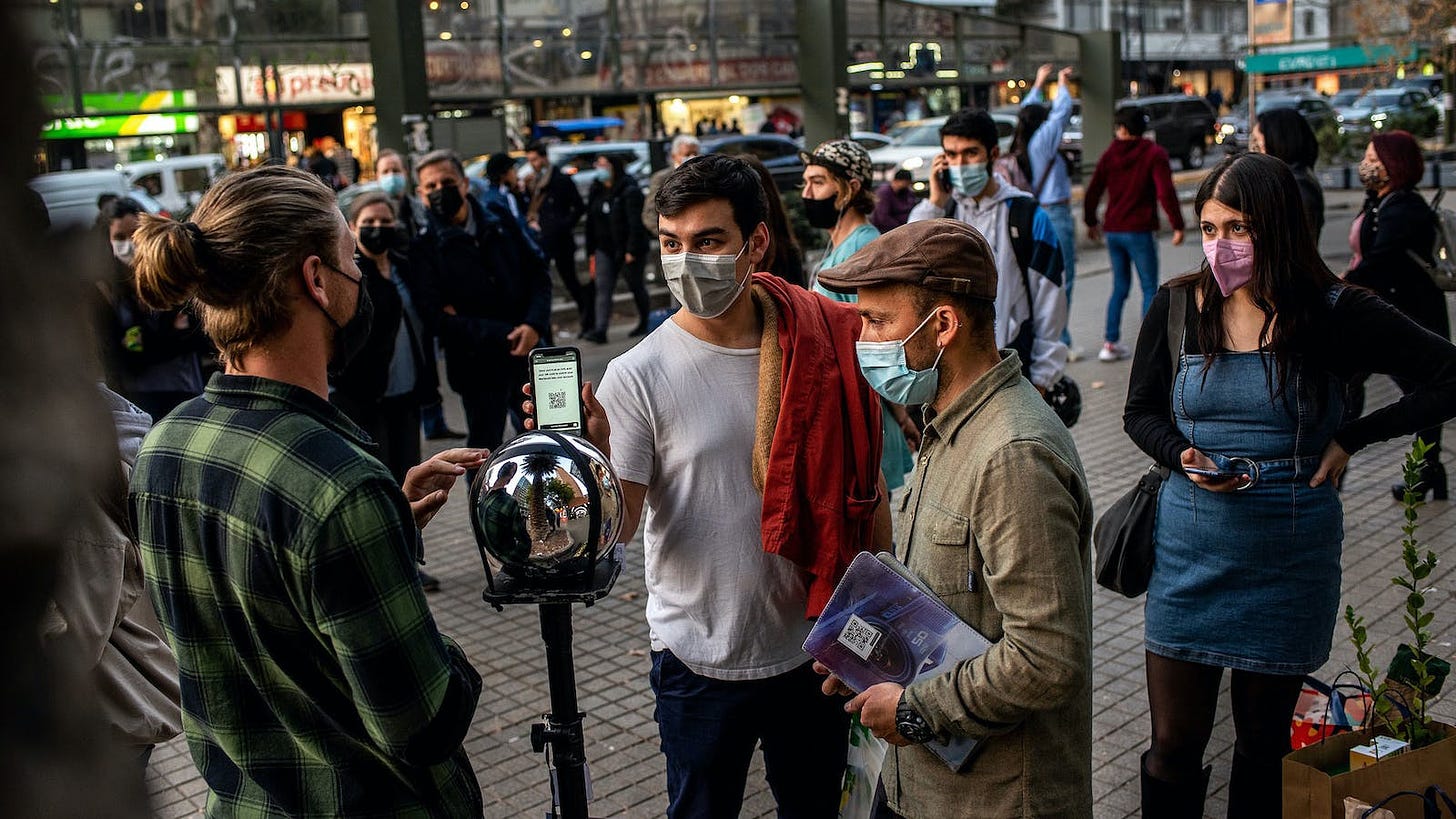GM,
Announcement: Administrative Matters
Next week, I will be taking a leave of absence, and as a result, there will be no publication of articles. However, the following week, the publication will resume as usual.Additionally, I would like to remind all members about the upcoming gathering, scheduled for August 19th (Saturday) at 2:00 PM. If you have already registered for the event, kindly make sure to mark your calendars and attend. For those who missed the initial registration, starting today, we are opening a waitlist.One week before the event, regardless of whether you managed to secure a spot from the waitlist or not, I will send out notifications to inform everyone of the results.Thank you for your attention, and I look forward to seeing you all at the gathering!
This week, the "Scan Eye Iris" project, led by OpenAI co-founder Sam Altman, announced the issuance of WLD coins on the blockchain under the Worldcoin initiative. Simultaneously, trading of WLD coins has commenced on multiple exchanges. Those who contributed their eye iris data to the Worldcoin project over the past three years will receive a WLD airdrop. Furthermore, Worldcoin plans to continue distributing airdrops to these individuals at regular intervals, effectively creating a form of Universal Basic Income.
Currently, each WLD coin is valued at approximately $2 to $3, resulting in each person receiving an amount ranging from $80 to $150. While it may not make one "rich," it is still enough to enjoy a nice meal in Taipei. Surprisingly, unlike the usual celebrations seen when money is given away, there is a significant number of skeptics regarding the WLD coin airdrop. People have raised concerns about this model of contribution (eye iris data) and income (WLD) and questioned whether it compromises their personal information.
As with any innovative project that involves sensitive data, privacy and data security are essential considerations. While Worldcoin assures the decentralized storage of iris scanning data and adheres to strict privacy policies, individuals understandably remain cautious about sharing their biometric information.
As the Worldcoin initiative continues, it will be crucial for the project to address these privacy concerns transparently and provide clear explanations of how user data will be used and protected. Ensuring a robust and trustworthy framework will be essential for building trust among users and the broader community.
This article discusses why Worldcoin utilizes eye scanning and whether one should opt to scan their eyes and receive an airdrop if a Worldcoin machine were present before them.
Witch Hunt
On the internet, there is a discussion about people who claim to have their personal information "sold out." Out of ten individuals, nine of them have not read the documents released by Worldcoin and rely solely on intuition to make conclusions, leading to misunderstandings and even spreading misinformation. The very first sentence in the Worldcoin documents states:
The original intention behind the establishment of Worldcoin is to create an indiscriminate identity and financial network, collectively owned by the majority of humanity. If successful, Worldcoin could become a reliable method to differentiate between AI and humans on the internet, while simultaneously safeguarding individual privacy, increasing economic opportunities, and even realizing internet democracy.
Worldcoin's project aims to establish individuals' digital identities and resist Sybil attacks.
The concept of Sybil attacks, which refers to online armies of fake or zombie accounts, has been previously introduced by Blocktrend. Currently, these online armies influence public opinion merely by posting malicious comments. However, as assets become more digitalized, the reach of these armies could extend to influence assets as well. The unequal distribution of online voices and the abundance of misinformation already pose significant challenges, but in the future, these armies might even impact the allocation of public resources, exacerbating wealth disparities.
Differentiating truth from falsehood on the internet has always been a challenging task. In the past, netizens often claimed, "Seeing is believing," but with the rapid development of AI, the cost of generating fake audio and video content has drastically decreased, making it increasingly difficult to distinguish fact from fiction. To address this issue, one must identify fundamental differences between humans and AI, those unique attributes possessed solely by humans.
While fingerprint (Touch ID) or facial recognition (Face ID) are commonly used for identity verification on mobile devices, fingerprints wear off over time, and facial features may change. In contrast, the eye iris is not only a unique biological characteristic but also highly accurate. Worldcoin's aim is to establish a difficult-to-falsify digital identity through the scanning of individuals' eye iris.
Some may view Worldcoin's approach as a pretentious act. They might suggest that to weed out bots on the internet, people can simply authenticate their identities, as AI bots wouldn't possess government-issued passports or ID cards. Although this method seems straightforward, it is also fragile, as it would require everyone to depend on governments or corporations. While people in Taiwan might be willing to accept such a system, it might not be feasible elsewhere. The most reliable solution is to have everyone directly tied to nature itself – establishing digital identities based on biological traits.
This is precisely why Worldcoin issues WLD coins – to create economic incentives for the implementation of this digital identity mechanism.
Economic Incentives
There's no such thing as a free lunch. Worldcoin provides individuals with WLD coins, but only those who have undergone iris scanning are eligible to receive them. In the eyes of many, this may seem like an "unethical" trade-off, with Worldcoin seemingly trying to obtain valuable eye iris data in exchange for WLD coins worth thousands of Taiwan dollars.
Indeed, WLD coins are not gifts from the heavens but rather an economic incentive utilized by Worldcoin to maintain the proper functioning of the digital identity mechanism and prevent the emergence of a "human trafficking" situation in the digital world.
Hackers are omnipresent. If someone intends to build an online army, all they have to do is mass-register accounts on various platforms using email addresses and let automated programs take over. Soon, their army will be up and running. However, if the digital world of the future requires iris-scanned accounts to be recognized as genuine human users, some hackers might resort to 3D printing fake irises onto mannequins to deceive Worldcoin's machines. But a more practical and cost-effective approach would be to simply pay real individuals to provide their genuine iris data.
While machines can authenticate authenticity, they cannot discern the true intentions of those who come to scan their irises. At this point, someone with ulterior motives could easily pay individuals 100 USD to go in front of the machine and "take a look," then request them to hand over their private keys. Likely, many scanning stations would have long queues. After all, people might not know the purpose of Worldcoin's iris scanning or care about the development of the digital world. Only money is the universal language of the world, and economic incentives can change people's behaviors.

Therefore, the Worldcoin project initially attracts attention by issuing and unconditionally distributing WLD to individuals. If you sell your iris data to others, you won't receive the airdrop in the future! For users, WLD serves as a form of unconditional basic income. However, for Worldcoin, WLD is essential expenditure to maintain the proper functioning of the digital identity mechanism, thus raising the cost for hackers to acquire digital identities.
In an ideal scenario, when people realize that the future value of WLD will surpass $100, they would be less willing to sell their digital identities. With Worldcoin's established digital identity as the foundation, government, corporations, or private organizations can utilize "networks instead of roads" to improve resource allocation efficiency. Therefore, WLD is not a reward for people "selling their irises," but an unconditional basic income for becoming digital citizens of Worldcoin.
However, this is only an ideal situation. In reality, the Worldcoin project faces numerous challenges that need to be overcome, with the most immediate concern being the issue of token price.
Potential Collapse
If I were to scan my iris and receive WLD, my first thought might be to sell it and exchange it for basic income. But if everyone who receives WLD intends to sell and no one is willing to buy, the token price will plummet.
The first lesson in token economics is designing the supply and demand scenario for tokens. The supply depends on which behaviors the project seeks to incentivize and reflects the project's core value. In the case of Worldcoin, it rewards those who personally scan their eye iris and become digital citizens. Only those who complete the task can receive WLD rewards.
The challenge lies in the future. After people receive WLD, they will surely question where they can use it. Worldcoin's current answers include participating in governance or circulating it among friends and family. However, these answers are relatively vague.
In the physical world, many people are forced to use a certain fiat currency due to government regulations, such as in countries with severe inflation like Zimbabwe or Argentina. But if given the choice, few would prefer to use such weaker currencies; they would instead opt for strong currencies like the US Dollar.
The same applies to the cryptocurrency space. Within a week of its issuance, WLD is a severely weak cryptocurrency. Unless one genuinely believes in the future development of Worldcoin, selling WLD immediately is a common decision. However, if numerous applications are built on top of Worldcoin in the future or WLD becomes the currency people must use for certain actions, the true demand for WLD will emerge. In the short term, I anticipate that as people's novelty for Worldcoin diminishes, the value one can exchange for WLD will decrease. This continues until the project emerges from the dark period, welcoming the moment of "dawn."

Moreover, many people have concerns about the privacy of iris data, but I am less worried about this aspect. Based on publicly available information, Worldcoin does not possess individuals' iris data; instead, it only stores the hashed values of the iris scans (IrisHash). These hashed values themselves hold no meaningful information and are difficult to reverse-engineer into the original data. Their sole purpose is to identify whether the same person tries to register multiple times to receive two unconditional basic incomes.
Of course, if Worldcoin intends to act maliciously, they could tamper with the hardware. However, I speculate that the probability of such actions is low. At least for now, Worldcoin can provide clear answers as to why they scan people's iris and that those who receive WLD coins are not selling their personal information.
If ChatGPT is currently the world's most powerful spear (AI), then Worldcoin aims to become the world's most robust shield (real-person certification). The comparison of which is more formidable, the spear or the shield, goes beyond historical textbooks; it is a part of the technological development history in which we are actively participating. However, it is probably unimaginable in the past that the competing spear and shield would be forged by the same person (Sam Altman).
If tomorrow, I encounter a Worldcoin machine at Sogo Department Store, my motivation for approaching it would not solely be to receive WLD and exchange it for a meal, but also to gain a sense of participation in witnessing history unfold.
Blocktrend is an independent media outlet sustained by reader-paid subscriptions. If you think the articles from Blocktrendare good, feel free to share this article, join the member-created Discord for discussion, or add this article to your Web3 records by collecting the Writing NFT.
In addition, please recommend Blocktrend to your friends and family. If you want to review past content published by Blocktrend, you can refer to the article list. As many readers often ask for my referral codes, I have compiled them into a single page for everyone's convenience. You are welcome to use them.



